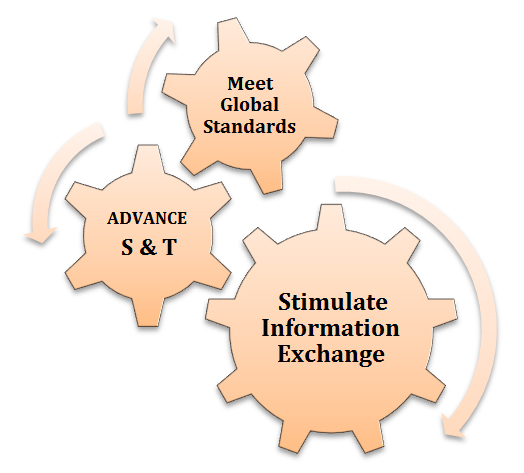RD Grants
RESEARCH EQUIPMENT GRANTS
Technology Grants
Travel Grants
SEEP Grants
NSF Grant Scheme to support Science Education and Popularization Programmes organized by Schools and Universities
The National Science Foundation (NSF) provides financial support for programmes organized by schools and universities with the following objectives.
- Uplifting the standard of science education and popularization in the country.
- To support science education and popularization programmes in schools and Universities.
- Enhancement of knowledge and skills of the general public on latest science and technology developments.
Only the School Science Societies and University Science Societies which are registered with the NSF are considered for the Scheme (registration with the NSF can be obtained free of charge).
Programmes will be considered in two major categories as Science Education Programmes and Science Popularization Programmes, as follows.
| Science Education Programmes | Science Popularization Programmes | |
| Types of programmes |
Improvement of school science laboratories
|
|
| Time frame |
|
|
| Funding |
|
|
| Required documents | Duly completed application with the following,
|
Duly completed application with the following,
|
| Memorandum of Understanding (MoU) | An MoU should be signed with the NSF | Not necessary |
Directions for applicants :
- Application forms can be obtained from the NSF by sending a self- addressed and stamped envelope or directly downloaded from the NSF website (www.nsf.ac.lk)
- Duly completed applications should be sent to Director General, National Science Foundation, 47/5, Maitland Place, Colombo 07.
- Applications should be submitted at least 2 1/2 months prior to commencement of the programme.
- Funding will be based on the recommendation of the relevant Committee on Science Popularization and approval of the Board of Management.
- Funding will not be provided for, accommodation, subsistence payments and local transportation.
- To request remaining installments, a report of financial and physical progress of the previous installment should be submitted to the NSF along with a request letter.
- To reimburse the final 10%, the original receipts for expenses should be provided.
- Final Report with the impact / outcome of the programme should be submitted to the NSF at the end of the programme along with the financial statement for the whole programme authorized by the Principal (schools) / Bursar (universities).
- If the above report and the financial statement have not been submitted, the remaining funds of the approved budget (10 %) will not be provided, and the particular school / university will not be considered for any further financial assistance under this scheme.
- Any balance funds should be returned to the NSF within one month, after completion of the programme.
- Sponsorship of the NSF should be clearly mentioned and NSF Logo should be clearly displayed in all the activities related to the said programme. The following logo should be obtained from the NSF.
Downloads
Overseas Training
Recognizing that scientific knowledge and its applications are central for national development at all levels, the National Science Foundation in alignment with the National Science Technology and Innovation Strategy has introduced the Overseas Special Training Programme (OSTP) to financially assist scientific and technical personnel, (science administrators, science educators, S&T policy makers & science communicators) as well as full time research students to acquire overseas training up to 12 months. Read more
IP SAT
International Partnerships for Science and Technology (IPSAT) is directed at promoting international research collaborations, technology transfer, and at obtaining expertise towards developing a globally-engaged research and scientific community in Sri Lanka. IPSAT will develop institutional capacities for meeting goals of the ST & I strategy . Read more
Founding for S&T Publications
NSF has initiated this grant scheme to financially support authors to publish books/monographs and other reading materials related to Science & Technology and to increase the availability of printed/online materials in Science and Technology relevant to local needs
Considering the importance of the publication to the local needs, qualifications/experience of the author in the related field , accuracy of content and the way of presentation, the grants will be provided.
Please see guidelines for more detail
Downloads Application Form (pdf)
Supporting Page Charges
Research publications enable the sharing of the findings with others so that they can benefit from the new knowledge which has been discovered. It also gives project findings the opportunity to be critically evaluated, reproduced and thus gains validity. Therefore the way to reach the widest audience is to publish the findings in a reputed journal. Read more
Oversease Science Educations
Overseas Science Education Programme of NSF (OSEP)
“OSEP is to provide an international exposure on trends in modern science, technology, research and innovation to Sri Lankan school children, teachers (Science, Technology, Engineering and Mathematics; STEM) and University Undergraduates in order to upgrade and improve their knowledge on science, technology and innovation to face the challenges of the modern world by providing financial assistance.’
PROGRAMME GUIDELINES
Categories of candidates and types of programmes
| Category | Types of programmes |
| School Children (Grade 09 upward) | o Participation at Intel ISEF o Participation at International Olympiad o Other Science Competitions overseas o Training programmes on Science education / science popularization overseas o Other overseas activities identified by the NSF |
| School teachers (STEM) | o Training programmes on Science education / science popularization overseas o Science Competitions overseas o Intel ISEF o International Olympiad o Seminars / Conferences related to science education and science popularization overseas o Other international competitions and activities identified by the NSF |
| University undergraduates | o Science Competitions and Science Fairs overseas o Seminars / Conferences related to science education and science popularization overseas o Other overseas activities identified by the NSF |
Eligibility criteria
- * Applicant must be a citizen of Sri Lanka.
Directions for applicants
- * Applications can be obtained from the NSF by sending a self- addressed stamped envelope or directly downloaded from the NSF website.
- * Duly completed applications should be sent to Director General, National Science Foundation, 47/5, Maitland Place, Colombo 07.
* Applications should be submitted at least 3 months prior to commencement of the programme.
* After a grant is awarded it is non-transferable and non-deferrable.
* The decision of the NSF Board of Management will be final.
* Any form of canvassing is regarded as a disqualification.
Funding
- * Airfare, food and accommodation will be provided to the selected group (s) by the NSF.
- * Government schools and Universities registered with the NSF will be fully funded. Private and International schools registered with the NSF will be partially funded (50 %).
* Funding will be based on the recommendation of the relevant Committee on Science Popularization and approval of the NSF Board of Management. Decision of the Board of Management will be the final.
Contact
- * Science Popularization Division: 0112696771 (ext-111,104,108)
- * Applicants must be from schools (school children: Grade 09 upward; Teachers: STEM teachers) and University Science Societies registered with the NSF.
-
OSEP Application (doc 76kb)
- Programme Brief (pdf 362kb)
- Report Format (doc 130kb)
ICRP
INTRODUCTION
Through collaborative research programmes, a synergetic achievement is intended by such means as sharing knowledge and research facilities. This programme is specially designed to develop International Research Collaborations between Sri Lankan and International Research Institutions.
This programme will facilitate active researchers at any stage of their carrier to share and disseminate new and original ideas and/or techniques, initiate and undertake collaborative research/technology development and facilitate interaction and training of scientists, engineers, science and technology policy makers and research personnel.
OBJECTIVES

KEY POINTS FOR ELIGIBILITY:
At least two researchers should collaborate;
A Principal Investigator (PI) affiliated to a Sri Lankan University or a Research Institution
&
A Principal Investigator (PI) affiliated to a Foreign University or a Research Institution
Minimum qualifications for the PI – Sri Lanka
Sri Lankan citizen and currently residing in Sri Lanka
Registered under NSF STMIS Database
Affiliated to a Sri Lankan University or a Research Institution
Master’s degree with a minimum of one year full time research component
WORTH TO NOTE:
• An applicant cannot have more than two ongoing research projects funded by the NSF as a PI at NSF.
• Identifying an international collaborator and preparing a joint proposal is the responsibility of the PI.
• NSF will not entertain applications directly from the International collaborators for funding under any component of ICRP.
• For More details refer the ‘ICRP Guidelines’ or contact NSF
DOWNLOADS :
• ICRP Application 1 (Doc)
• ICRP Application 2 (Doc)
• ICRP Guidelines




